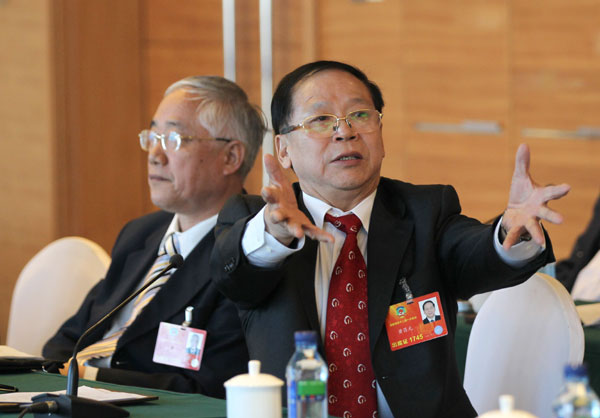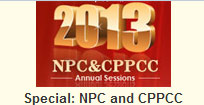Cultural regulators set to be merged
Updated: 2013-03-11 07:32The planned merger of two regulators, one on press and the other on broadcasting, announced on Sunday by State Councilor Ma Kai, will boost the development of Chinese culture and increase its global influence, officials said.
According to Ma's report to the annual session of the national legislature, as one part of the State Council's institutional reform, the General Administration of Press and Publication, or GAPP, and the State Administration of Radio, Film and Television, or SARFT, will be combined into one to deepen the reform of cultural institutions and optimize their resources.
 |
|
Huang Changyuan, a member of the Chinese People's Political Consultative Conference, the nation's top political advisory body, attends a panel discussion during the annual session of the CPPCC in Beijing on Sunday. Zou Hong / China Daily |
The new State Administration of Press Publication, Radio, Film and Television will supervise the related organizations, the content and quality of their products and manage copyright, Ma said.
"The merger will ... promote Chinese culture domestically and globally," said GAPP's deputy director Wu Shulin.
Zhang Pimin, deputy director of SARFT, said the merger will help clarify the duties of different departments in the fight against crime in the cultural market.
The reform of the cultural sector started in 2003, turning hundreds of former government institutions - publishers, theaters and the like - into companies and enterprises that are operated according to market rules. The reform brings vitality to both the public cultural organizations and the cultural business.
|
 |
Both press and broadcasting organizations face rising challenges from the multimedia and new media sectors, said Wang Feng, with the State Commission Office for Public Sector Reform, the main drafter of the institutional reform.
"The merger is designed to minimize the overlap of duties, increase efficiency, and better prepare the media for new challenges, with greater competitiveness," Wang said.
Local bureaus of the two administrations have started merging, laying a foundation for the move at the central level.
Experts said the merger will help create big and powerful media groups.
Wei Peng, professor in cultural economy with Central University of Finance and Economics, told the media the merger will help cut red tape in the examination and approval of the cultural sector.
Zhang Zejing, an analyst with Hongyuan Securities, described the merger as "great news" that will help lift the price of related stocks.
Change of the government's role after the merger is the key to its success, members of the top advisory body said during a discussion on Sunday.
"The new administration needs to decentralize power, and operate the relevant business based on market rules," said Wang Qiu, head of China National Radio.
Cao Kefan, a TV anchor with Shanghai Television, said: "As traditional media are facing a crisis, I hope the new administration will do more to attract more capital into the sector, even from foreign investors."
Former GAPP director Long Xinmin said he hopes the new administration will cater to the cultural needs in rural areas, where such resources are scarce.
The CPPCC members also suggested the name of the administration could be shorter.
"I hope it has a more proper name that sounds more recognizable," said GAPP's Wu.
Contact the writers at meijia@chinadaily.com.cn and hewei@chinadaily.com.cn


